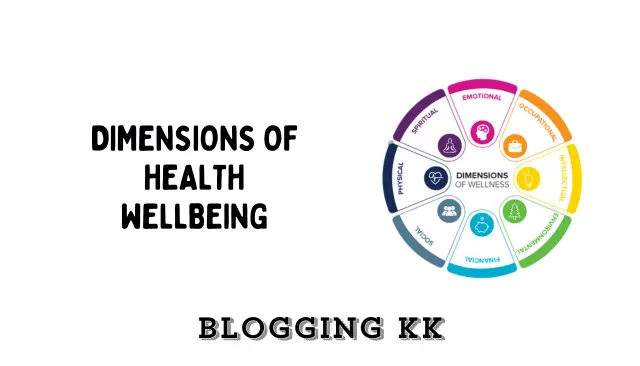In today’s fast-paced world, the concept of health is often reduced to the absence of disease. However, true health encompasses much more than just physical wellbeing. It is a multifaceted state of being that integrates various dimensions, including physical, mental, emotional, social, spiritual, and environmental health. This article explores these dimensions of health, illustrating how they contribute to overall wellbeing and offering practical steps to achieve a balanced and healthy lifestyle.

Understanding the Dimensions of Health
Contents
Health is not a one-dimensional construct; it is a complex interplay of several factors. Recognizing these dimensions is crucial for fostering a holistic approach to wellbeing.
1. Physical Health
Physical health is the most visible dimension, encompassing fitness, nutrition, and the absence of illness. It involves:
- Regular Exercise: Engaging in physical activity strengthens muscles, boosts cardiovascular health, and enhances overall fitness.
- Balanced Nutrition: A healthy diet rich in fruits, vegetables, whole grains, and lean proteins provides the essential nutrients needed for optimal functioning.
- Adequate Sleep: Quality sleep is vital for recovery and rejuvenation, impacting both physical and mental health.
Tip: Aim for at least 150 minutes of moderate aerobic exercise weekly, along with strength training exercises on two or more days.
2. Mental Health
Mental health refers to cognitive and emotional wellbeing. It encompasses our ability to think, learn, and manage stress. Key components include:
- Stress Management: Developing coping strategies such as mindfulness, meditation, or yoga can reduce anxiety and improve mental clarity.
- Cognitive Function: Engaging in activities that challenge the brain, such as puzzles or learning new skills, supports cognitive health.
- Seeking Help: Don’t hesitate to consult mental health professionals when needed.
Tip: Practice mindfulness techniques for at least 10 minutes a day to enhance mental clarity and emotional regulation.
3. Emotional Health
Emotional health involves understanding, managing, and expressing feelings in a constructive manner. It includes:
- Self-Awareness: Recognizing one’s emotions and understanding their impact on behavior is crucial for emotional health.
- Healthy Relationships: Building and maintaining supportive relationships enhances emotional wellbeing.
- Resilience: Developing the ability to bounce back from setbacks is a vital aspect of emotional health.
Tip: Journaling can be an effective way to process emotions and reflect on personal experiences.
4. Social Health
Social health pertains to our relationships and interactions with others. It includes:
- Community Engagement: Participating in community activities fosters a sense of belonging and support.
- Effective Communication: Healthy communication skills enhance relationships and reduce misunderstandings.
- Support Systems: Surrounding oneself with positive influences and supportive friends is key to social wellbeing.
Tip: Make time for social interactions, whether through family gatherings, friendships, or community events.
5. Spiritual Health
Spiritual health involves finding purpose and meaning in life, which can be achieved through various practices:
- Reflection: Spending time in reflection or meditation can deepen your sense of spirituality.
- Values and Beliefs: Understanding and aligning with your core values contributes to a fulfilling life.
- Connection with Nature: Many find spiritual health through connection with nature, fostering a sense of peace and belonging.
Tip: Explore different spiritual practices, such as meditation or nature walks, to enhance your spiritual wellbeing.
6. Environmental Health
Environmental health focuses on the relationship between individuals and their environment. It encompasses:
- Sustainable Practices: Engaging in environmentally friendly practices, like recycling and conserving energy, supports overall health.
- Healthy Living Spaces: Ensuring a clean and safe living environment contributes to physical and mental wellbeing.
- Connection to Nature: Spending time outdoors and appreciating nature can enhance mood and reduce stress.
Tip: Create a healthy living environment by minimizing clutter and using natural products.
Integrating the Dimensions of Health
Achieving optimal wellbeing requires a balanced approach that integrates all dimensions of health. Here are some practical steps to achieve this balance:
- Set Goals: Identify specific, measurable goals for each dimension of health. For example, aim to exercise three times a week or meditate daily.
- Create Routines: Establish daily routines that include physical activity, healthy meals, and time for relaxation and reflection.
- Prioritize Self-Care: Make self-care a priority by scheduling time for activities that nourish your body, mind, and soul.
- Seek Support: Don’t hesitate to seek help from professionals, whether for physical, mental, or emotional health concerns.
- Stay Informed: Educate yourself about health topics to make informed decisions regarding your wellbeing.
The Importance of Holistic Health
A holistic approach to health recognizes that each dimension is interconnected. Neglecting one area can impact others, leading to an overall decline in wellbeing. For instance, poor physical health can lead to emotional distress, while a lack of social support can exacerbate mental health issues. Embracing a multifaceted view of health encourages a more comprehensive and effective approach to achieving and maintaining wellbeing.
FAQs: Exploring the Dimensions of Health
What are the key dimensions of health?
The key dimensions of health include physical, mental, emotional, social, spiritual, and environmental health.
How can I improve my mental health?
Improving mental health can involve practicing mindfulness, seeking therapy, engaging in physical activity, and maintaining social connections.
Social health is important because it fosters support systems, enhances emotional wellbeing, and contributes to a sense of belonging.
How do I achieve a balanced approach to health?
Achieving balance involves setting goals across all dimensions, creating healthy routines, prioritizing self-care, and seeking professional support when needed.
Can environmental factors affect my health?
Yes, environmental factors such as pollution, access to clean water, and living conditions can significantly impact physical and mental health.
Conclusion
Understanding and exploring the multifaceted dimensions of health is crucial for achieving optimal wellbeing. By recognizing the interconnectedness of physical, mental, emotional, social, spiritual, and environmental health, individuals can adopt a holistic approach to their health journey. Prioritizing each dimension and integrating practical strategies into daily life can lead to a healthier, more fulfilling existence.